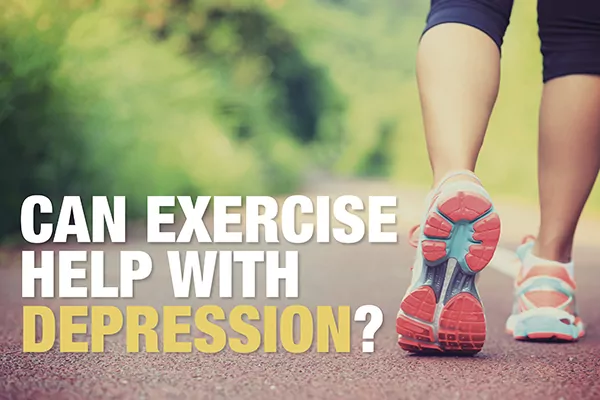Depression affects people in different ways and can cause a wide variety of symptoms from feeling persistently low in mood to experiencing suicidal feelings. Some of the other common symptoms include feeling constantly tired, lacking in appetite, a reduction in sex drive, and physical aches and pains.
The National Institute for Health and Care Excellence (NICE) recommend that those suffering with depression should exercise for around 45-60 minutes three times per week, or for around 150 minutes per week.
Regular exercise has been proven to:
- Reduce stress
- Prevent anxiety and depression
- Boost self-esteem
- Improve sleep
- Strengthen your heart
- Increase your energy levels
- Lower your blood pressure
- And so on
If you are suffering with depression, you are likely to feel depleted of energy, making exercise seem very unappealing. This can leave you in an ongoing loop of depression. However, exercise doesn’t have to be running, Zumba, or weightlifting. It can be anything that gets your body moving, including yoga, walking, or swimming.
Hormones
When you exercise, your body releases endorphins which interact with the brain receptors that reduce your perception of pain, acting as an analgesic. These endorphins also trigger a positive feeling in the body, similar to that of morphine (without the addictive qualities).
Regular exercise can also positively impact the release of serotonin and dopamine, which boost your mood and overall sense of wellbeing. Dopamine can also impact your appetite and sleep cycles, both of which are usually compromised in those with depression.
Furthermore, regular activity can stimulate the release of noradrenaline, which balances your body’s level of stress hormones (such as adrenaline).
The Brain
Dr William Walsh, Director of the Walsh Research Institute, asserts that most people who suffer with depression have something wrong with their brain chemistry. He states that although life experiences can make things worse, the dominant problem is usually in the brain.
So, how does exercise impact the brain?
Regular exercise has been shown to increase the volume of certain areas of the brain; partly through increased blood supply to the brain, and partly through an increase in neurotrophic factors (i.e. the growth of nervous tissue) and neurohormones that support neuron signalling, growth, and connections. Essentially, regular exercise boosts the health of the connections in certain areas of your brain.
One of the main areas of the brain that is impacted by regular exercise is the hippocampus. The hippocampus plays an important role in the consolidation of information from short-term memory to long-term memory, and in spatial memory that enables navigation. It is also involved in emotional regulation and learning.
The Harvard Health blog has reported that exercise leads to hippocampus growth in animals, and emerging research is showing that the same is true in humans.
There is also accumulating evidence that many mental ill health conditions, but particularly depression, are associated with reduced tissue growth in the hippocampus. For example, research published by Molecular Psychiatry has shown that antidepressants promote the growth and development of neural tissue in the hippocampus, where they were previously thought to only impact serotonin.
Increased neural tissue development, especially in the hippocampus, increases our mental flexibility, which allows us to break free from unhelpful thought patterns, see opportunities, and change our behaviour. As much mental ill health is characterised by a cognitive inflexibility that keeps ups stuck in unhealthy thought and behaviour patterns, and unable to see solutions, it is plausible that exercise leads to better mental health through the impact that it has on the increased capacity for flexible thinking.
Which Exercise?
The type of exercise that you choose to participate in, will largely depend on your preferences and physical ability. Anything from running up mountains to yoga will have a positive impact on your mental health.
MyProtein, a sports nutrition brand) conducted a survey and found that the most effective exercise for lifting depression (among those who answered) was weight training, followed by running, jogging, walking, and gym cardio.
It is worth trying out a few options to see what works best for you. However, if you enjoy dancing, then a dance-based fitness class would probably be best for you. Equally, if you hate dancing, but enjoyed netball or football as a child, perhaps finding a local team would be your best option.
Exercising outdoors comes with increased benefits including giving you a boost of vitamin D, a change of scenery, and a breath of fresh air. Alternatively, exercising with friends or in a group is likely to give you additional mental health boosts as you can enjoy the physical stimulation of exercising while also getting social stimulation as well.
If you’d like professional therapeutic support then get in touch with us by calling 020 8673 4545 or emailing [email protected] We have appointments available at our centres in Clapham and Tooting, seven days a week.








